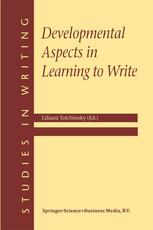

Most ebook files are in PDF format, so you can easily read them using various software such as Foxit Reader or directly on the Google Chrome browser.
Some ebook files are released by publishers in other formats such as .awz, .mobi, .epub, .fb2, etc. You may need to install specific software to read these formats on mobile/PC, such as Calibre.
Please read the tutorial at this link: https://ebookbell.com/faq
We offer FREE conversion to the popular formats you request; however, this may take some time. Therefore, right after payment, please email us, and we will try to provide the service as quickly as possible.
For some exceptional file formats or broken links (if any), please refrain from opening any disputes. Instead, email us first, and we will try to assist within a maximum of 6 hours.
EbookBell Team

4.8
54 reviewsDevelopmental Perspectives on Writing LILIANA TOLCHINSKY University of Barcelona, Spain The advent of the sixties is considered a crucial moment for the discovery of writing as an object worthy of intellectual inquiry (Havelock, 1986). A number of books, which came out in that decade, set the stage for this turn-to-writing. One of them was the Preface to Plato by Eric Havelock. This book, published in 1963, was to become a milestone in the discovery of literacy as a field of research (Bockheimer, 1998). Havelock (1986) referred to three more works that came out at the same time, and Bockheimer suggested adding other publications; for example La pensee sau vage by Levi Strauss (1962); The consequences of literacy by Jack Goody and Ian Watt (1963) and La geste et la parole by Laroi -Gourham (1964/65). The authors of these books were anthropologists, philosophers and sociologists who coincided in highlighting the significance of writing for human development and, more specifically, for language development. They maintained that many insti tutions, ideas, beliefs, opinions and convictions of the Western world were a by product of an 'alphabetized mind'. Writing was for them one of the pillars of subjec tivity, responsible for the rise of consciousness, for our conception of words and for our notion of true and false. Amazingly linguists, psycho linguists, psychologists and educators did not participate in the turn-to-writing. The firstl, did not give any atten- 1 There were some exceptions to this generalization.